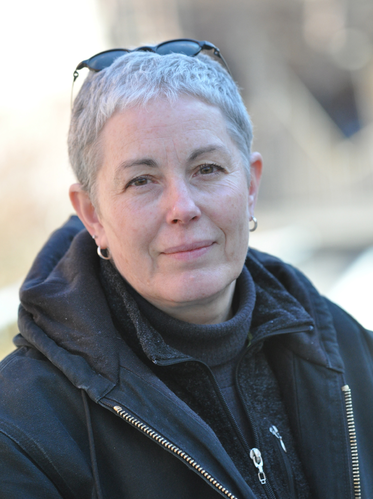Student Profile: Kearney Kirby

Kearney Kirby<br />
<strong>Hometown:</strong> Dorchester, MA<br />
<strong>Major:</strong> Music Therapy<br />
<strong>Instrument:</strong> Bass
Photo by Phil Farnsworth
You could say Kearney Kirby came back for an encore. From playing folk songs on her acoustic guitar, the Massachusetts native switched to cover bands and then played in the electronica/new wave band November Group before semi-retiring from the stage in 1990 to engineer and produce. But life had another turn in store. In 2001, as Kirby faced cancer, she also got an unexpected project that gave her professional interests a new shape.
Six years and several similar projects later, she came to Berklee to get formal training in music therapy. Now she's completing her final semester of course work before starting her internship. She's one of several students in Berklee's music therapy major who are over the age of 50, using their combined life and musical experiences to help others heal. The following is a condensed and edited account of our conversation.
Tell us about your first work in music therapy.
I had a major health event in 2001, and at the same time I was offered a project by the American Composer's Forum as an artist-in-residence working with battered women at Casa Myrna Vasquez, a shelter. I spent nine months working with these women. They were from all over the world. Not one of them was born in the United States or spoke English very well. Our work together was to write lullabies for their children as part of their healing process.
It was very intense. I saw them growing from being these women that were being beaten, terrorized by their husbands. The work we did together for them was life-changing. So that changed me. I hadn't ever had that experience of having such a deep personal effect on a person's life. I loved playing out; I loved people screaming. But this was so profound.
What are the differences between music therapy and performing?
It's not about whether or not you're fabulous. It's about the client. It's what they need. You use music to help your clients achieve a non-musical goal. For a kid, say, who's in the hospital, it does a couple of things. It distracts them. It gives them a sense of autonomy and control over their environment. It's great for their parents, too, because they get the kid they know back for the time of the session. Music is a glue that can help hold a person together while they try to deal with something else.
Watch Kirby in November Group's video "Put Your Back to It."
What's it like to go to school with students in their late teens and 20s?
We share our passion for music therapy, for music, and for being musicians, but obviously there are a lot of things I've already passed through. It's been interesting—sometimes painful and most of the time very gratifying—to see them grow from young people to mature adults.
With the workload, I'm grateful I don't have anything more to do than school. I'm not trying to figure out who I am and have a social life, find a mate, work. I did all those things.
Tell us about faculty members who have had an impact on you.
It's a very small department, so you can't get through here without someone having an impact. Suzanne Hanser is amazing. I don't know how she manages what she does. She writes books, she runs the department, she teaches, she has a practice—and a family too!
Kathleen Howland—I had her for research and I had her for practicum 5, medical. What an education that was. A very rigorous teacher. These are extraordinary women. You've got people who have been major movers and shakers in their field that are teaching here.
The music therapy has several required practicums plus an internship. What's your favorite fieldwork been so far?
My first practicum. I was at Perkins School for the Blind. It was amazing. I loved those kids. Their challenges really resonated with me. A lot of them had really severe medical issues. They were inside these bodies that they didn't have control over, and to be able to just connect with them, and to have them actually realize that they weren't by themselves, was really wonderful. We could share something as human beings. You could work both on getting them out of their isolation and work on their mobility issues at the same time.
What's your next step?
I'm going to be working in hospice when I do my internship. That's something that I know I couldn't have done, temperamentally and maturity-wise, in my 20s. I would feel very uncomfortable with a person who was dying. But now I've been through so much myself. I've had to look at my own mortality personally, right in the face. So for me it's actually a privilege to be able to help someone with that transition, and also help the family members. It's an important connection you make with other people.
You have different phases of your life, I think. Different things become important and valuable. And it's something that was unforeseen by me! If you had asked me when I was 20 if I would be doing this now I would've said, "Yeah right."
What's your advice for people considering the program?
It's never too late to make a change in your life and to do something different. Never be bored. Please don't ever be bored. There's always something new to do, something new to learn. And have fun, too. You have to have fun. If you don't have fun it's not worth it, right?
